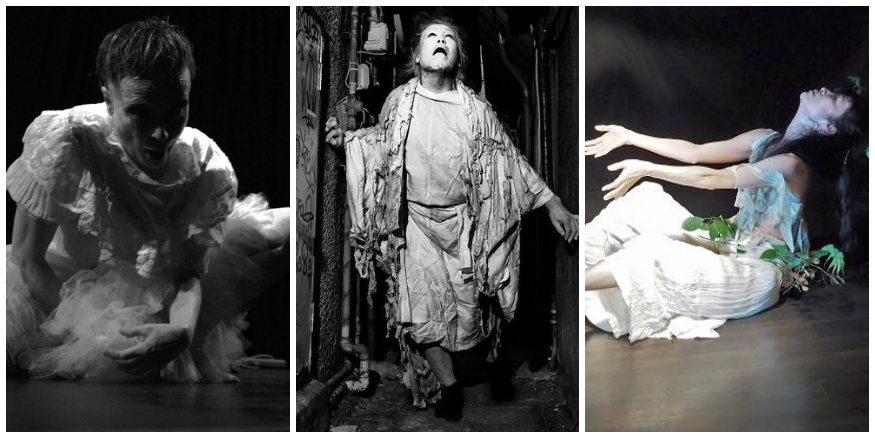Tatsumi Hijikata, the co-founder of butoh dance in post-World War II Japan, “was making major political and sociological stances,” says Julie Becton Gillum, artistic director of the Asheville Butoh Festival. “He believed butoh should be for the common people.” So should the current U.S. political climate drive Asheville dance fans to want to take in a butoh show or perhaps sign up for a lesson in the art form?
“It should,” Gillum says. “It does me.”
In fact, as part of her contribution to the Asheville Butoh Festival, Gillum will stage “Pledge,” which incorporates an American flag. Some people are offended by it, she admits. “People have said, ‘Why do you have to do that?’ I say, ‘It’s my flag, too.’”
But, she continues, “Butoh tends to be a little in your face. … If I’m not pushing people to question, I’m not doing butoh.” Now in its 12th season, the Asheville Butoh Festival runs Thursday-Sunday, Oct. 25-28, with three performances and two workshops.
The local happening, launched about 15 years ago (though, initially, it wasn’t held annually), is the longest-running event of its kind in the U.S. The San Francisco Butoh Festival, which Gillum regards as the quintessential butoh celebration in this country, only ran for a decade.
Still, despite the success of the Asheville event, it’s been mostly funded by private donors. This year was the first the Asheville Butoh Collective received a grant — $1,200 for the festival — from the Asheville Area Arts Council. “We’ve run that Butoh Festival on a shoestring for 12 seasons,” Gillum says. She adds, “I’m just happy it’s happening.”
Years ago Gillum — who has performed and taught dance in the U.S., France and Mexico for four decades — decided that since she probably couldn’t afford to travel around the world to all the butoh workshops she’d like to attend, she’d bring the dancers and instructors to Western North Carolina. At the time she wondered, “Will people be interested? Will they want it?” The last few years, she says, “They have. They come out of the woodwork. We mostly sell out.”
The Asheville Butoh Collective, which includes local artists Jenni Cockrell and Constance Humphries, could expand the festival, but the relatively small size makes it possible for them to bring the important figures from the butoh world. This year features Seisaku and Yuri Nagaoko from Tokyo. Seisaku studied with Hijikata and later joined the troupe of Yoko Ashikawa, one of the first female butoh artists. Nagaoko, who is also an actress, trained as a modern ballet dancer and discovered butoh in her late teens. “Since then, she has been active in creating and showing her own performance pieces, both in Japan and overseas,” according to a press release for the local festival.
In addition to Seisaku and Nagaoko’s stagings, Gillum will perform the solo retrospective Black, White, Red and Other. The four separate dances therein were choreographed in 2005, ’08, ’12 and ’16. “I picked two pieces I’ve performed a lot and two I have not,” Gillum explains. These include “Butap” (butoh with tap shoes) and a dance about 17th-century scholar, philosopher, composer, poet and nun Sor Juana Inés de la Cruz.
In returning to previous creations, “I always change them. There’s always something that needs to be reworked,” Gillum says. “I’m comfortable with being still and quiet. … I’ve gotten farther and farther from modern dance in my life. When I was doing modern dance, I felt like I needed to keep moving all the time. In order for it to be dance, you have to move. Well, no. Not necessarily.”
She adds, “Stillness, growing, expanding and somehow trying to feel more has changed my choreography and my performance, probably, too.” But putting Black, White, Red and Other onstage is a new challenge for Gillum, who has never done a retrospective before.
Like the philosophical challenge of “Pledge,” butoh offers various forms of provocation to viewers as well as dancers. Now in her 60s, Gillum is still asking herself, “Can I do something different? Can I do something better? Bigger, longer, harder? I don’t know. … How long can one challenge oneself, your body and your mind?”
Apparently for quite a while: Gillum points out that she saw Japanese dancer and butoh guru Kazou Ohno perform a full, evening-length work at age 95. And that example seems to serve as inspiration for Gillum, who says, “I don’t think I’d be happy if I wasn’t getting ready for some butoh performance.”
Such opportunities show no signs of slowing. The Asheville Butoh Festival returns in 2019 to produce works by Yuko Kaseki (in April) and Mari Osanai (in May) before launching its next fall festival.
WHAT: Asheville Butoh Festival, ashevillebutoh.com
WHERE: The BeBe Theatre, 20 Commerce St.
WHEN: Thursday-Sunday, Oct. 25-28. Performances Thursday at 7 p.m. and Friday and Saturday at 8 p.m. $18 general admission/$15 students and seniors. Workshops Saturday and Sunday, 1-5 p.m., $40



Before you comment
The comments section is here to provide a platform for civil dialogue on the issues we face together as a local community. Xpress is committed to offering this platform for all voices, but when the tone of the discussion gets nasty or strays off topic, we believe many people choose not to participate. Xpress editors are determined to moderate comments to ensure a constructive interchange is maintained. All comments judged not to be in keeping with the spirit of civil discourse will be removed and repeat violators will be banned. See here for our terms of service. Thank you for being part of this effort to promote respectful discussion.